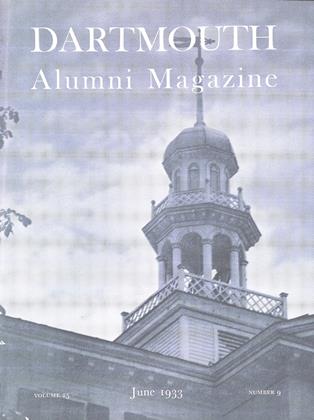BACON HAS WRITTEN in his essay Of Great Place that "Power to do good is the true and lawful end of all aspiring." Many progressive, forward steps in educational theory and administration are at once branded as radical, as dictated by ulterior motives. It still seems difficult for humans to believe that the historic college of liberal arts aspires only to do good. Unfortunately, the public, including the college public, yet searches beneath the wholly idealistic appearances and externals of an enlightened educational reform for self-seeking purposes.
Dartmouth's new plan of admission has been accorded, in these past few weeks, the faint praise one must expect from press and public. Yet secondary school authorities proclaim it to be thoroughly sound in principle and to give promise of working out entirely in line with its stated purpose. Dean Bill's explanation of the plan will be found in this issue. His statement in an address before the Dartmouth Secretaries Association May 12 that it will be harder for a mediocre student and easier for an exceptional applicant to gain admission under the revised system is a challenge to those who find Dartmouth "easing up" on requirements, and "letting down the bars."
The Selective Process was designed in 1921 to permit a grading of an excess of applicants in order that classes of about 650 freshmen might be admitted. With application lists running in excess of the large numbers of twelve years ago Dartmouth, in common with other colleges, still must rely upon measuring sticks other than outmoded examinations and certificate privileges in judging applicants. What could be more logical, more simple, more easily defended and understood than to turn this responsibility entirely over to the tried and true Selective Process?
Dean Bill's prophesies that within a few years the admission plans of other colleges will be revised along much the same lines as this new Dartmouth system. This might strike the reader as a rather extravagant statement except for the facts upon which it is based. The Selective Process itself has been taken over in whole or in part by many of our sister institutions. Much the same recognition has been paid to admission by the Honor Certificate and through the plan of Junior Admissions, as developed in Hanover. Certainly the College has pioneered in this whole field. The culmination of its leadership, as promised by the plan to be put into use next year, may well place Dartmouth in an even stronger position of showing the way in this matter.
Beginning with next year Dartmouth applicants will be judged according to the requirements of the Selective Process and their promise of doing good work in college. That is all. This simplification of all the time-honored and equally antiquated rules of college admission is refreshing. There exists in colleges a tremendous "power to do good." Only by admitting those who are really best qualified can this purpose become effective and can we say of ourselves that Dartmouth is moving toward this goal which is the "true and lawful end of all aspiring."
 View Full Issue
View Full Issue
More From This Issue
-
 Sports
SportsFOLLOWING THE BIG GREEN TEAMS
June 1933 -
 Article
ArticleHANOVER BROWSING
June 1933 By Rees Higgs Bowen -
 Class Notes
Class NotesClass of 1930
June 1933 By Albert I. Dickerson -
 Article
ArticlePIONEERING IN TELEGRAPHY
June 1933 By William U. Swan -
 Class Notes
Class NotesClass of IQ9 1
June 1933 By Jack R. Warwick -
 Article
ArticleSecretaries Convene
June 1933
Lettter from the Editor
-
 Lettter from the Editor
Lettter from the EditorCOMMUNICATIONS
MARCH, 1928 -
 Lettter from the Editor
Lettter from the EditorDartmouth Manuscript Series—The First Volume
MARCH 1932 -
 Lettter from the Editor
Lettter from the Editor'Round the Girdled Earth
March 1944 -
 Lettter from the Editor
Lettter from the EditorSettling in in Hanover
JUNE 1983 By Douglas Greenwood -
 Lettter from the Editor
Lettter from the EditorThe Numbers Game
JANUARY/FEBRUARY 1985 By Douglas Greenwood -
 Lettter from the Editor
Lettter from the EditorWhat's a Humane Letter?
February 1939 By JOHN PALMER GAVIT

